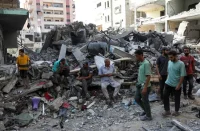The situation in Serbia’s breakaway autonomy, Kosovo and Metohija, increasingly drifts towards apartheid. Incidents in which locals Serbs, including children, are targeted or Orthodox churches, monasteries, and cemeteries are vandalized recur across the province, as the administration evidently attempts to squeeze out the UN mission and to establish itself as the absolute authority. That will largely become reality with the upcoming closure of the so-called International Civilian Office set up to oversee the implementation of Ahtisaari’s “comprehensive” plan: at the moment, Pristina is compiling a package of “legislative” reforms to strip the international bodies in Kosovo of any executive powers. On July 2, the International Steering Group, a joint venture between the 25 countries recognizing the Kosovo independence, announced that the mandate of the International Civilian Office would be recalled by the end of 2012, and the Financial Intelligence Center hastily passed its functions to the Kosovo administration on June 15. It is clear that the dismantling of the system of international oversight in Kosovo is on the horizon.
In the meantime, Pristina successfully wrestles with Belgrade. Serbia had to put the talks with the Kosovars on hold while the electoral campaign in the country unfolded and the resulting government was in the formative phase, but the deals sealed before the break were fairly deep and in many regards left an impression that Kosovo was already treated as a standalone country. One of the accords, for example, enabled residents from either side to cross into the other based on locally issued IDs. Technical details pertinent to heightened vehicle insurance tariffs which are being charged at the border are still on the table, but the problem is in principle resolved. In a move that outraged the resident Serbs, the Kosovo administration went so far as to outlaw, starting in July, the use of Serbian-issued license plates in the province – seen against the background, the spat over labeling the desks for the Kosovo delegation at the talks appeared to be a ridiculous form of lip service to the public opinion in Serbia. As of today, the official title of the Kosovo delegation is set to Kosovo, the asterisk indicating that the term does not reflect the positions on the Kosovo status and should agree with UN Security Council Resolution 1244 and the advisory opinion of the International Court of Justice on the Kosovo independence. The reference, actually, is misread in the context, considering that UN Security Council Resolution 1244 reaffirmed the territorial integrity of Kosovo, and the Court’s advisory opinion was limited to saying that proclaiming independence was not necessarily illicit. Worst of all, Belgrade deals with the separatist-run Kosovo as with a de facto independent country by allowing to insert formal issues into the talks agenda. The current list of themes – free movement of people and goods plus joint maintenance of checkpoints – is clearly out of range if Serbia is serious about its sovereignty over Kosovo, and the involvement of the Serbian foreign ministry in the talks is completely inappropriate.
Speaking of the security climate in the province, discrimination and violent outbreaks in Kosovo come with apartheid as a predictable part of the package. In line with what has already grown into a tradition, Albanians serially organize provocations on the days of Serbian holidays. On Vidovdan, tens of Serbs reportedly started a “confrontation” with the Kosovo police at a border checkpoint in Merdare, hurling stones and trying to bring down a poster saying “The Border of Kosovo”. The UN Secretary-General’s recent report on the UN mission in Kosovo said thirty policemen and an unspecified number of Serbs sustained bodily injuries in the incident. The UN Secretary-General was nevertheless aware that firearms were used against the Serbs (shots were supposedly fired in the air), but believed that they were drunk and were the side to initiate the clashes. Still, according to the UN Secretary-General, the police might have used disproportionate force and the laws – international and even those in effect in Kosovo – normally require that probes be opened under this type of circumstances, but the province’s minister of the interior Bajram Rexhepi stated that the police protected the Kosovo border from Serb hooligans and did nothing wrong.
In another incident which took place of the main expressway in Pristina, Albanians threw stones and Molotov cocktails at several buses carrying children from Gazimetsan to their home Gračanica, injuring 16 children who had to be hospitalized. The response of the Kosovo police which admitted to certain deficiencies in its operative plans was a parody but earned it accolades from the UN Secretary-General.
On top of mistreating the Kosovo Serbs, the administration of the province shows undisguised disrespect for the EU countries rejecting its independence claim. The five EU countries – Slovakia, Spain, Cyprus, Greece, and Romania – had to request legal assistance from Eulex, but at all times Europe’s foreign-policy creed tends to be centered around some sort of appeasement. On June 14, European Commissioner responsible for Home Affairs Cecilia Malmström handed over to the Kosovo authorities the roadmap to the liberalization of the visa regime, and on June 27 the European University Association churned out stamps of approval for the first pile of transcripts awarded by Kosovo learning institutions.
Some advancements did materialize in the investigation into human organs trafficking in Kosovo. The Pristina district court is to hear EU Council special rapporteur Dick Marty who will testify in the notorious Medicus clinic case on September 3. Seven individuals face trial in its framework, some of them over the trafficking as such, others – however weird that may sound, over unauthorized medical activities and service abuses. A person linked to the case was arrested in Israel last May with the the Interpol’s taking part. The conclusion inescapable from the outset is that the case should not have been fed to the Kosovo judicial system whose credentials are below criticism even if Eulex judges are added to the panel to save face. On May 2, a mixed Pristina jury comprising a local judge and two dispatched by Eulex acquitted Fatmir Limaj, Naser Krasniqi, Nexhmi Krasniqi, and Naser Shala of war crimes in the Klecka case, in which six others had been similarly cleared of charges earlier on. The credibility of international courts, on the other hand, is also dubious – former Kosovo Liberation Army commander Fatmir Limaj, for example, is known to have committed mass atrocities against Serbs in the Lipjan concentration camp and elsewhere but easily got off the hook in the International Criminal Tribunal for the former Yugoslavia, as, by the way, did former “Kosovo premier” Ramush Haradinaj.
In a couple of weeks, the UN Security Council will convene to discuss the reports of the UN Secretary General and the EU High Representative for Foreign Affairs on the international missions in Kosovo. Hopefully, they will be asked to explain with utmost clarity, what punishments await those guilty of mass crimes in the province, especially the attacks on Serb children, and what progress had been achieved in the inquiry into the human organs trafficking. It is imperative that the reports meet with the ruthless assessment which they deserve – it must be stated that the missions do not comply with their obligations as their mandates require them to and that convincing steps are overdue to remedy the situation. This is what the UN Security Council is under an obligation to accomplish given Resolution 1244, which asserts the territorial integrity of Serbia. Moreover, the UN Security Council should do whatever it takes to bulldoze the apartheid regime built by the Albanian “administration” in Kosovo and Metohija, which is Serbia’s autonomous province.
Source: Strategic Culture Foundation














Comments